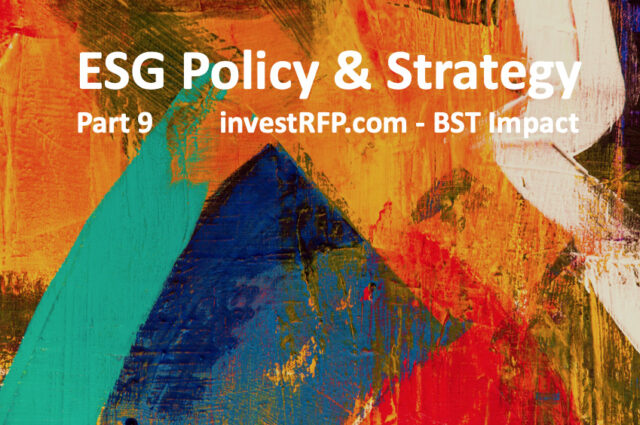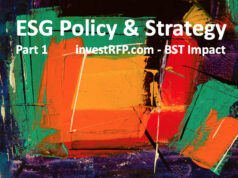By Kristina Touzenis, Managing Partner BST-Impact
| For any investor and company who want to be invested in, it would be beneficial to have a policy/guidance which establishes a process that reviews the companies’ internal policies, makes suggestions to strengthen said policies, ensure implementation processes and reporting on the basis of international standards.
Such a policy with ensuing processes should include guidance on when it is necessary to make a decision to divest in case no progress in made for companies which may pose potential risk.
This is an enormously important point and can be made with reference to accountability and participation principles and monitoring and evaluation done based on human rights principles and the eventual human rights policy that could/should be developed for all investors who want to be ready to comply with forthcoming legislation on ESG issues. Again this should be accompanied by suggestions on such processes for ensuring continued accountability.
| Reporting – a cyclical process
The process needs to be cyclical so you create a robust strategy; link your indicators to that; and then your reporting will inform where you’re not doing enough, where you could be doing better, where you need to engage or disengage – but also where you are not reporting all the good you are doing.
But it has to makes sense for you specifically and not be something that has been created as a framework or Excel sheet that is just being sent out to 500 other asset managers.
Importantly this does not mean that there will not be harmonization because you will be working on a framework that is standardized and that is harmonized but some norms will be more important for you. If you are a VC or are a bank with a broad ESG portfolio the strategy and reporting will differ and should differ. We go back to being able to say “N/A” to certain questions and feel confident knowing that you do not need to answer 7500 questions that really do not apply to you.
A norms based approach allows for setting
concrete short- medium- and long-term goals
around sustainability and progress and to
effectively and honestly tell what those are,
what the challenges are, and what is
being done to work towards those goals.
| Respect for rights
Many investors or regulators do not necessarily have an appreciation of the fact that worldwide implementation and respect for rights happens in extremely complex settings.
This means that progress may be slow and even at times hindered. Having a norms-based approach will help show how impact is made, at a different speed, even in complex settings where e.g. weak infrastructures, low educational level, general lack of respect for rights, lack of access to basic services, presence of corruption or widespread unrest may require to take into consideration and evaluate different contextual elements using specific parameters.
The notion of “progressive realization” of rights was developed to allow for States with lesser available resources to not be held in violation if they did not reach the same levels of e.g. health care as developed countries, and to reflect a recognition that the realization of economic, social and cultural rights can be hampered by a lack of resources and can be achieved only over a period of time.
But a lack of resources cannot justify inaction in protecting and promoting these rights nor indefinite postponement of measures to implement these rights! This is a notion which often escapes people living in the global north when reading reports or set due diligence standards. A norms-based approach will help create REAL impact and REAL engagement, both in the societies where you invest as well as with investors and policy makers.
This article is the Part 9 of a series on “ESG Policy & Strategy”
Part 1: Why asset owners need a good sustainable investment policy and strategy?
Part 2: SFDR aims at preventing greenwashing and ensuring data comparability
Part 3: Working towards the SDGs – at 360 degrees
Part 4: Due Diligence, Supervision and Enforcement Mechanisms
Part 5: Bringing down to “Earth”
Part 7: ESG as a real sustainability tool
Part 8: Awareness and attention towards rights and starndards
Part 10: ESG Policy & Strategy – Key Questions
Expert/Specialist Feedback on investRFP | Kristina Touzenis | BST-Impact
| about
Kristina Touzenis is the Managing Partner of BST Impact. A lawyer and a recognized leader in the effective and concrete operationalization of international human rights standards and principles in complex settings worldwide requiring long-term engagement with a multitude of stakeholders, form both the public and private sectors. She has more than 20 years of experience in advocacy, human rights reporting, monitoring, and evaluating as well as in policy making and negotiating at national, regional, and global level. Kristina founded BST Impact with two other partners in mid 2020, together with a pool of experts to help companies and investors to effectively operationalize ESG criteria, SDGs, international norms and the Business and Human Rights agenda into their respective sustainable business strategies, investment processes and risk assessment management systems. Previously, Kristina created the International Law Unit at the International Organization for Migration – IOM, the UN Agency for Migration and served as Head of the Unit from 2011 to 2020. She engaged with government counterparties on legislation development and review as well as with other Agencies within the UN common system, on advocacy and implementation of programmes worldwide. Prior to her appointment at the IOM HQ, Kristina worked from 2006 to 2011 in the IOM Regional Office for the Mediterranean Region, on translating international norms and standards into practice on the ground and from 2002 to 2006 on implementing children’s rights in the Mediterranean Region for an NGO.
| All opinions expressed are those of the author. investESG.eu is an independent and neutral platform dedicated to generating debate around ESG investing topics.









